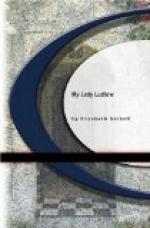Well, to go back to that day when I limped into my lady’s sitting-room, trying hard to look as if I had not been crying, and not to walk as if I was in much pain. I do not know whether my lady saw how near my tears were to my eyes, but she told me she had sent for me, because she wanted some help in arranging the drawers of her bureau, and asked me—just as if it was a favour I was to do her—if I could sit down in the easy-chair near the window—(all quietly arranged before I came in, with a footstool, and a table quite near)—and assist her. You will wonder, perhaps, why I was not bidden to sit or lie on the sofa; but (although I found one there a morning or two afterwards, when I came down) the fact was, that there was none in the room at this time. I have even fancied that the easy-chair was brought in on purpose for me; for it was not the chair in which I remembered my lady sitting the first time I saw her. That chair was very much carved and gilded, with a countess’ coronet at the top. I tried it one day, some time afterwards, when my lady was out of the room, and I had a fancy for seeing how I could move about, and very uncomfortable it was. Now my chair (as I learnt to call it, and to think it) was soft and luxurious, and seemed somehow to give one’s body rest just in that part where one most needed it.
I was not at my ease that first day, nor indeed for many days afterwards, notwithstanding my chair was so comfortable. Yet I forgot my sad pain in silently wondering over the meaning of many of the things we turned out of those curious old drawers. I was puzzled to know why some were kept at all; a scrap of writing maybe, with only half a dozen common-place words written on it, or a bit of broken riding-whip, and here and there a stone, of which I thought I could have picked up twenty just as good in the first walk I took. But it seems that was just my ignorance; for my lady told me they were pieces of valuable marble, used to make the floors of the great Roman emperors palaces long ago; and that when she had been a girl, and made the grand tour long ago, her cousin Sir Horace Mann, the Ambassador or Envoy at Florence, had told her to be sure to go into the fields inside the walls of ancient Rome, when the farmers were preparing the ground for the onion-sowing, and had to make the soil fine, and pick up what bits of marble she could find. She had done so, and meant to have had them made into a table; but somehow that plan fell through, and there they were with all the dirt out of the onion-field upon them; but once when I thought of cleaning them with soap and water, at any rate, she bade me not to do so, for it was Roman dirt—earth, I think, she called it—but it was dirt all the same.




